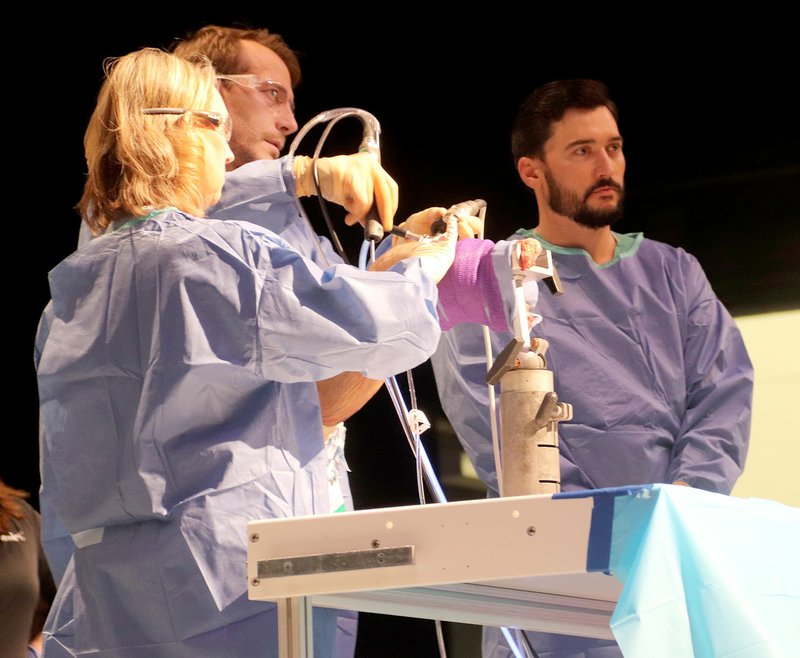FARMINGTON -- About 200 students from Farmington, Prairie Grove, Lincoln and Northwest Technical Institute watched in silence earlier this month as a doctor performed a live knee surgery on a leg from a cadaver that belonged to a 73-year-old man with arthritis.
Farmington High School applied for a grant about a year ago to bring the program to the school for its students. Administrators then decided to open up the program, called the Future Health Care Providers Lab, to other interested students in the area.
The program, sponsored by Mid-South Orthopedics of Little Rock, uses cadavers to help students learn about the human body and to introduce students to different career choices available in the medical field.
Dr. Andrew Heinzelmann with Ozark Orthopaedics in Fayetteville explained each step to the students as he repaired the anterior cruciate ligament, or ACL, during a surgery performed on the stage of the Farmington Performing Arts Center.
Students were not allowed to have their phones out and could not record or take photos during the surgery. Cadavers donated to science are treated with respect, Heinzelmann said.
The students could see every move Heinzelmann made on a large screen above the stage. Heinzelmann's work was captured by a surgical camera he used to give students a look inside the leg.
Heinzelmann explained that the ACL is commonly injured in sports. As part of the presentation, he showed several photos where a knee was injured during a sporting event. The students did not remain silent as they viewed these photos, as the injuries were obvious to those looking at the images.
When repairing a torn ligament, surgeons can use two methods, Heinzelmann said. One is autograft or using tissue from the patient's body. The other is allograft, using tissue from someone else.
Students were able to watch as Heinzelmann created a tunnel in the knee for a new ligament.
Following the 30-minute surgery, Heinzelmann opened up the floor for questions and students wondered about pain medication and if anesthesia was used for the surgery. Heinzelman said patients are placed under anesthesia, or put to sleep, during the surgery and are given a nerve block to help with pain when they wake up. They also are sent home with pain relievers.
Another student asked why water was used in the surgery. Water expands the inside of the knee so that surgeons can see better, Heinzelmann said.
In response to another question, Heinzelmann said he usually is in the clinic during the mornings and can perform four to six surgeries during the afternoon.
For the second half of the lab, a smaller group of students was allowed to come on stage for a hands-on experience with the cadaver knee and to watch up-close a dissection of a cadaver arm.
Clayton Williams, Farmington High assistant principal, said the demonstration and hands-on experience are examples of what the high school wants to do for its students.
"In a regular classroom, they'd never get a whiff of this," Williams said.
Through the cadaver lab, they were able to learn about different careers in the medical field, whether it's being a doctor or surgeon, an assistant in surgery or working for a company like Mid-South Orthopedics that provides medical devices to hospitals and doctors.
It's just as important helping students figure out what they want to do as helping them to figure out what they don't want to do, Williams said.
"If a student is queasy, there are still other things you can do in the medical field," he added.
Ellen Tidwell, a healthcare pathways instructor with Northwest Technical Institute, brought some of her students to the demonstration. She had already seen cadaver labs at conferences she attended.
"Anything we can bring to them or give them is an opportunity to explore," Tidwell said.
Brian Wallace, president of Mid-South Orthopedics, said the company tries to sponsor two labs each semester in the state.
"This is all about supporting the schools," Wallace said. "It's a way for us to give back. If we can take cadavers and use them for education, we can give back to the community."
Mid-South is a surgical sales company and is a distributor for Arthrex devices to large hospitals and facilities in the region.
General News on 02/26/2020

